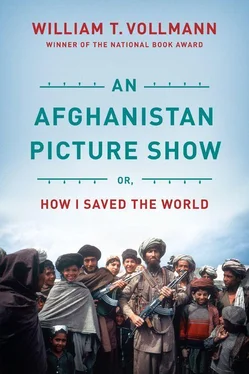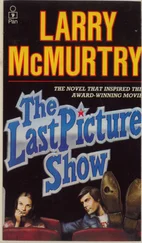“They don’t ask for things they don’t need,” said Levi wryly. “They just ask for everything , whether they need it or not. ‘Give me the white pill. Give me this yellow.’ Give me this, give me that. — Oh, I’ll give you an example. We’re doing family planning. We have these contraceptive pills. So. One of these men got hold of our contraceptive pill, because it comes in pink color. And he’s taking it, because he loves the color!” —He laughed. — “I hope he don’t get pregnant.”
The Young Man remembered something that Levi had told him earlier. “Do any of them still hold your medical teams at gunpoint?”
“Well, not anymore,” Levi said. “But they always say, ‘All of this medicine belong to us anyway; give us all this!’ But when we give them proper explanation, they say okay. They are stubborn, but they listen … In here, well, the Afghans are lazy. They do not want to help themselves. The Indochinese refugees, they work very hard for themselves. Here,” Levi chuckled, “they don’t help you. You pay them, they help you.”
“What do you think the best thing the Americans could do for the refugees would be?”
“I really don’t know,” Levi said. “Well, the Americans are giving a lot of food, and I think they should keep it up. †Why? Well, now we are facing so many Afghans already in Pakistan. If we can keep them healthy, that’s a very good sign; that’s very good. We have to anticipate that those Afghans in Afghanistan, in which, in the long run, there might — who knows? — be an emergency, they will cross Afghanistan like the Kampucheans and be dying of hunger. Then we face only one problem — that one, because we keep the refugees here healthy. So that is why, I hope, a lot of people will give more.”

Prescription form for illiterate refugees, the dosage and timing being indicated by the number of pill-symbols blackened and the sun positions.
THE GIVER
Levi was the sort of person that the Young Man had always wanted to be, and never would be. He was quick, brave, effective. During the first outbreak of that disease called Khmer Rouge, he had gone regularly into Cambodia to bring the refugees out. (You knew when you had crossed the border, he said, because suddenly in the jungle you began to see the bodies.) Sometimes he treated the wounded on the spot. He had flown in and out of Phnom Penh under fire. If anyone helped people, Levi did. He gave the Young Man medicines for his dysentery, dark beer and prime cut for his homesickness, and even paperback romances in English for the worst of the hot Peshawar afternoons. (“Dirty books!” said the General.) Everyone got on with Levi, from the pretty girls at the American Embassy to the refugees themselves. And he seemed to run the I.R.C.’s field operation very capably, which meant that he had no illusions about anything.
THE PARABLE OF THE BEER CANS
One morning at around seven they were passing through a bazaar on the way to a checkup of Hangu Camp. It was quite hot already, and they saw a soft-drink stand. — “Pull over there, Hassan,” Levi said. “You two want what to drink? Sprite? Coca-Cola?” —The Young Man and Hassan settled on Sprite. Levi got out to buy the drinks. The Young Man stepped out, too. At once he was required to decline a shoeshine, a hat and a live chicken. Then a kid came up to ask Levi for money. He was a skinny, runty-looking little boy, with his hair cut almost bald in the pragmatic Pakistani fashion. He was a Pathan; he might have been either Pakistani or Afghan. He looked like one of the black-and-white magazine pictures of hungry children whom relief organizations invite you to sponsor. — “I —no mother,” he said. “Please, rupees, please.” —Levi laughed, dropping a straw in his drink. — “You don’t have a mother? You’re very lucky. You do what you want; nobody give you a hard time!” And presently they had all finished their sodas, and Hassan started the engine.
Once the Young Man had worked on a ranch in California with a fellow named Mike. Mike was very idealistic. He even believed in Jerry Rubin. Their truck stalled on them one day six miles from the ranch, so they started the walk back to get another vehicle. After they had taken a few steps, Mike saw a beer can. He picked it up. A few steps later he saw another can. He picked it up. The Young Man looked along the shoulder of the highway where they were walking. As far as he could see there were cans. He pointed this out to Mike. Mike said nothing. Soon his arms were so full of cans that he could not carry any more. They came to the next can. Mike set the cans down and crushed them with his boot; then he gathered them up again. The two of them walked on, Mike always picking up cans, until at last his arms were so full of crushed beer cans that he could not carry any more. The Young Man, who had been anticipating this for some time, waited to see what Mike would do. Mike stopped for a moment, thinking. Then he put his cans down in a neat stack at the side of the road, walked on, and picked up the next can. When they finally reached the ranch, Mike had left little caches of cans behind them for six miles. The ranch manager bawled them out for taking so long to get back. That Saturday, Mike borrowed a truck, collected all his cans with it, and took them to the dump. For a few days, six miles of one side of the highway was pristine.
Thinking about Mike and the beer cans, the Brigadier and the toads, the Afghans and the Russians, the relief groups and the refugees, the Young Man shrugged a little. He supposed that the boy with no mother was one of those cans on the other side of the road. — Then Levi laughed again. — “You know,” he said, “last time I was there, he told me he had no father. I ask him, ‘All right, you have no father; where’s your mother?’ He pointed up the hill and said, ‘Up there.’ Now he’s learning. He’s a very bright boy.”
GREAT STRIDES FORWARD [1]
The refugees kept coming and coming. Year after year, the ants fled the toads. “They have probably killed a hundred thousand Afghans altogether now,” an ex-professor told me in 1984. “Government officials are not killed on the spot; they are given a just trial and sent to jail, but villagers — villagers and freedom fighters — are killed on the spot. This is done regardless of age. If a village is bombed and someone is found alive, even a woman who does not know how to use a machine gun, she is killed on the spot, because her crime is that she helped the Mujahideen. A child is killed on the spot, a child! Even animals like horses are killed so that freedom fighters cannot use them.”
VARIOUS SIGHTS
At some of the camps they sat in the sun for hours in front of the signs: MALARIA DISPENSARY, TUBERCULOSIS CHECK. There were not enough doctors.
In the I.R.C. camps near Kohat he very often saw the malnourished infants, tightly swaddled in the heat, too weak to disturb the flies that crawled across their faces.
Then for his Afghanistan Picture Show a young boy whose face was spattered with fine birthmarks like a buttermilk pancake stepped forward smiling with mouth and greenish-black eyes and his friend set a watermelon upon his head!
The old ones sat still. They must know that they would die in Pakistan. The little girls tilted their heads at him and ran away coyly, as little girls seem to do almost everywhere. The men took him inside their mud houses and showed him photographs of the martyred ones — large, grainy black-and-white posters on the walls. They showed him their guns and told him that their sons, their uncles, their brothers were in Afghanistan right now killing Russians, and when the others returned they themselves would go. They smiled.
Читать дальше













